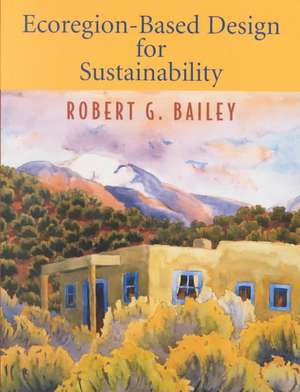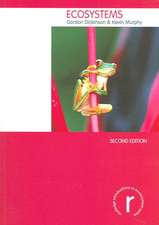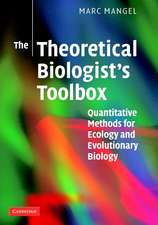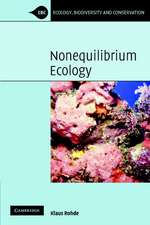Ecoregion-Based Design for Sustainability
Autor Robert G. Bailey Desene de L. Ropesen Limba Engleză Paperback – 2 iul 2002
"Bob Bailey ÄisÜ the man behind the ecosystem mapping of the world."
(Lingua Franca Reviews of Ecoregions)
"The book provides easy access to the geographic distribution, characteristics, and processes operating behind every major ecosystem in the world."
(Geoscience Canada)
"For schools and colleges Ecoregions offers an invaluable source of description, interpretation and analysis of global patterns of ecosystem distribution and successfully provides the reader with a means of making sense of these patterns."
(Geography)
Robert G. Bailey is a geographer with the United States Forest Service in Fort Collins, Colorado, and leader of the agency's Ecosystem Management Analysis Center.
| Toate formatele și edițiile | Preț | Express |
|---|---|---|
| Paperback (1) | 391.22 lei 6-8 săpt. | |
| Springer – 2 iul 2002 | 391.22 lei 6-8 săpt. | |
| Hardback (1) | 397.01 lei 6-8 săpt. | |
| Springer – aug 2002 | 397.01 lei 6-8 săpt. |
Preț: 391.22 lei
Nou
Puncte Express: 587
Preț estimativ în valută:
74.86€ • 78.36$ • 62.31£
74.86€ • 78.36$ • 62.31£
Carte tipărită la comandă
Livrare economică 31 martie-14 aprilie
Preluare comenzi: 021 569.72.76
Specificații
ISBN-13: 9780387954301
ISBN-10: 0387954309
Pagini: 223
Ilustrații: XIII, 223 p.
Dimensiuni: 178 x 254 x 11 mm
Greutate: 0.49 kg
Ediția:2002
Editura: Springer
Colecția Springer
Locul publicării:New York, NY, United States
ISBN-10: 0387954309
Pagini: 223
Ilustrații: XIII, 223 p.
Dimensiuni: 178 x 254 x 11 mm
Greutate: 0.49 kg
Ediția:2002
Editura: Springer
Colecția Springer
Locul publicării:New York, NY, United States
Public țintă
GraduateCuprins
Nature’s Geometry.- Regional-Scale Ecosystem Units, Ecoregions.- An Ecoregional Approach to Sustaining Ecosystems.- Significance to Ecosystem Management.- How Land-Management Agencies, Conservation Organizations, and Others Use Ecoregion Maps.- Summary and Conclusions.
Recenzii
From the reviews:
"The book moves well beyond classical ecology and links with environmental sustainability. … The illustrations and examples Baily uses in this discussion are both persuasive and diverse. … The appendices give useful information. Those not acquainted with the subject will benefit from these sections. Overall, the book is a ‘good read’, which even experienced professionals should enjoy because transdisciplinary communication, as well as communication with laypersons, can be vastly improved." (John Cairns, Jr., Environmental Conservation, Vol. 30 (4), 2003) "This richly illustrated book completes Robert G. Baily’s celebrated study of ecoregions, begun in the landmark Ecosystem Geography (1996) and further articulated in Ecoregions (1998). … This book will be welcomed by land and resource managers, landscape architects and urban planners, ecologists, students, and anyone interested in ecology-based design." (Ethology, Ecology & Evolution, Vol. 14 (4), 2002)
“This text is the third in Bailey’s explanation and exposition of the ecoregion concept. … Overall, this is a very useful text. It describes ecoregions in ways in which they could be understood easily by the lay person. To assist this, the text is excellently illustrated using a wide variety of sources (postcards, photographs, maps etc.) which help to emphasise the utility of the ecoregion concept. … It deserves the widest readership.” (Teaching Ecology Newsletter, 2003)
“Text includes a concise overview of Bailey’s classification system … . most useful for those who prefer a quick overview of the ecological rationale for the delineation of ecoregions. An extensive list of references is included for those interested in … ecoregion concept. … Its principle contribution to a landscape ecologist’s library is the discussion of the panoply of uses to which the ecoregion maps have been put. … most appropriate for students of landscape architecture or general ecology, as well as landscape ecologists … .” (Andrew Lister, Landscape Ecology, Vol. 18, 2003)
"The book moves well beyond classical ecology and links with environmental sustainability. … The illustrations and examples Baily uses in this discussion are both persuasive and diverse. … The appendices give useful information. Those not acquainted with the subject will benefit from these sections. Overall, the book is a ‘good read’, which even experienced professionals should enjoy because transdisciplinary communication, as well as communication with laypersons, can be vastly improved." (John Cairns, Jr., Environmental Conservation, Vol. 30 (4), 2003) "This richly illustrated book completes Robert G. Baily’s celebrated study of ecoregions, begun in the landmark Ecosystem Geography (1996) and further articulated in Ecoregions (1998). … This book will be welcomed by land and resource managers, landscape architects and urban planners, ecologists, students, and anyone interested in ecology-based design." (Ethology, Ecology & Evolution, Vol. 14 (4), 2002)
“This text is the third in Bailey’s explanation and exposition of the ecoregion concept. … Overall, this is a very useful text. It describes ecoregions in ways in which they could be understood easily by the lay person. To assist this, the text is excellently illustrated using a wide variety of sources (postcards, photographs, maps etc.) which help to emphasise the utility of the ecoregion concept. … It deserves the widest readership.” (Teaching Ecology Newsletter, 2003)
“Text includes a concise overview of Bailey’s classification system … . most useful for those who prefer a quick overview of the ecological rationale for the delineation of ecoregions. An extensive list of references is included for those interested in … ecoregion concept. … Its principle contribution to a landscape ecologist’s library is the discussion of the panoply of uses to which the ecoregion maps have been put. … most appropriate for students of landscape architecture or general ecology, as well as landscape ecologists … .” (Andrew Lister, Landscape Ecology, Vol. 18, 2003)











